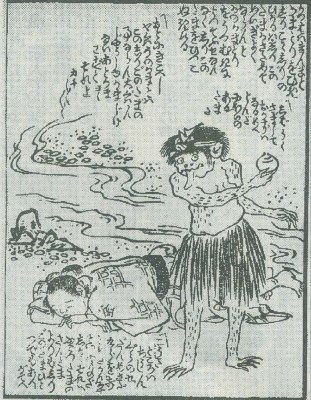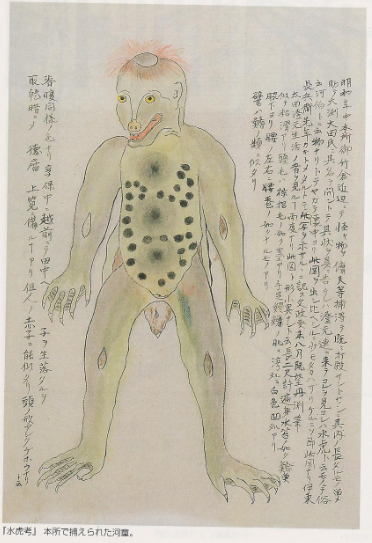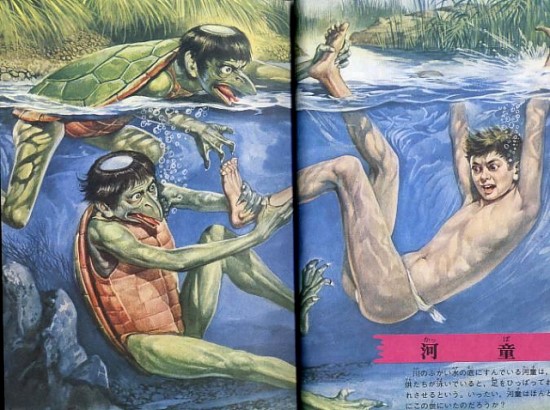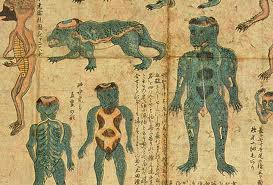
|
|||
Village of the Dead: Lake Anjikuni Mystery Disappearances
Source : https://en.wikipedia.org/wiki/Kappa_(folklore)
Kappa are Japanese flesh-eating water imps who live in rivers, lakes, ponds, and other watery realms. They smell like fish and are generally portrayed with the body of a tortoise, ape-like head, scaly limbs, long hair circling the skull, webbed feet and hands, and yellow-green skin. They are often depicted with a tortoise shell attached to their backs. Some say they can change color like the chameleon. They abhor metal objects and loud noises (cannon fire, gunfire, etc.). The defining characteristic of the Kappa is the hollow cavity atop its head. This saucer-like depression holds a strength-giving fluid. Should you chance upon the quarrelsome Kappa, please remember to bow deeply. If the courteous Kappa bows in return, it will spill its strength-giving water, making it feeble, and forcing it to return to its water kingdom. About the size of a child aged 6 to 10, the Kappa is nonetheless incredibly strong. It attacks horses, cattle, and humans, usually dragging its prey into the water, where, according to various legends, it feeds on their blood, or drains their life force, or pulls out their livers through their anuses, or sucks out their entrails, leaving nothing behind except a hollow gourd. In some tales, the Kappa is associated with theft and raping women. Stories tell of Kappa pulling little children into the water and drowning them. In many localities, drowning is still referred to as GAPPADOKO. SHIRIKODAMA. As drowning victims are generally found with a distended anus (swollen rectal), the Kappa is also sometimes called the shirikodama (lit. = anus ball) vampire. The shirikodama is a mythical ball at the mouth of the anus. In order for the Kappa to steal the liver of the victim (by reaching its arm up into the victim’s anus or shiri ), the Kappa must first suck out or remove the shirikodama, which means certain death for its former owner. The belief in this ball is rather mysterious, and scholars have come up with various explanations. One explanation is the commonly observed “open anus” of drowning victims (as if something had been removed or sucked out). Another conceivable reason could be the Tanden or "elixir field," which is located beneath the navel and represents the focal energy point in age-old yogic breathing and meditative techniques. Some Japanese scholars (Ando / Seino 1993) say the Kappa offers the shirikodama and/or liver as tribute to a snake-shaped dragon deity (the lord of water, the most powerful of all water deities). But, in my mind, the most probable explanation relates to the term tama, which can mean either ball or jewel. When read as “jewel,” it could easily mean life force, spirit, or soul. In paintings (see drawing by Jippensha below), the shirikodama is sometimes portrayed as a jewel with a pointed top -- one that looks exactly like the Hoju (Skt. = Cintamani), the sacred all-powerful wish-granting jewel of Buddhist lore. 
BONE SETTING SKILLS, MEDICAL SKILLS Kappa are mostly evil, but not always. When benevolent, the Kappa is supposedly a skilled teacher in the art of bone setting and other medical skills. In the real world of medicine, the term “kappa” refers to a monoclonal plasma cell related to bone marrow. In addition, the Kappa is always portrayed as trustworthy despite its many evil ways. When captured and forced to promise never again to harm anyone, the kappa always keeps its promise. Kappa often help or mentor those who outwit them or capture them. Writes scholar Michael Dylan Foster: : “The kappa is notorious for attempting to lure horses and cows to a watery death; but the key word here is attempting. In most versions of this legend, the kappa fails; its plan backfires and it (or just its arm) is pulled by the startled horse all the way to the stable. The kappa's success rate in fondling women's shiri in the toilet may be slightly higher, but often on its second attempt its arm is grabbed and yanked from the body. And when its mischief goes awry, when it is weakened from losing water from its sara or incapacitated (emasculated) by a yanked-off arm, the honest and benevolent side of the kappa's nature surfaces. In order to be set free or receive back its arm (the arm can often be reattached within a certain number of days), the kappa will take an oath. It will pledge, for instance, to stop harassing people in the area, or to assist with work in the fields, or to teach its captor secret bonesetting techniques and formulas for making medicine and salves. It should be noted that this last trait - the kappa's familiarity with bonesetting and other medical procedures - is one of the most widespread of the beliefs associated with the kappa (see Ishikawa).” Kappa are usually seen as mischievous troublemakers or trickster figures. Their pranks range from the relatively innocent, such as looking up women's kimonos, to the malevolent, such as drowning people and animals, kidnapping children, and raping women. As water monsters, kappa have been blamed for drownings, and are often said to try to lure people into water and pull them in with their great skill at wrestling. They are sometimes said to take their victims for the purpose of drinking their blood, eating their livers, or gaining power by taking their shirikodama , a mythical ball said to contain the soul, which is located inside the anus. Even today, signs warning about kappa appear by bodies of water in some Japanese towns and villages.  Kappa are also said to victimize animals, especially horses and cows. The motif of the kappa trying to drown a horse is found all over Japan. In these stories, if a kappa is caught in the act, it can be made to apologize, sometimes in writing. This usually takes place in the stable where the kappa attempted to attack the horse, which is considered the place where the kappa is most vulnerable. Kappa are also known for raping women. An 18th-century ukiyo-e image by Utamaro depicts a kappa raping an ama diver underwater. In his Tono Monogatari, Kunio Yanagita records a number of beliefs from the Tono area about women being accosted and even impregnated by kappa. Their offspring were said to be repulsive to behold, and were generally buried. It was believed that, if one was confronted with a kappa, there were a few means of escape. Kappa are obsessed with politeness, so if a person makes a deep bow, it will return the gesture, the water in the plate on its head spills out and it is rendered unable to leave the bowing position until the plate is refilled with water from the river in which it lives. If a person refills it, the kappa will serve that person for all eternity. A similar weakness of the kappa involves its arms, which can easily be pulled from its body. If an arm is detached, the kappa will perform favors or share knowledge in exchange for its return. Another method of defeat involves shogi or sumo wrestling: a kappa sometimes challenges a human being to wrestle or engage in other tests of skill. This tendency is easily used to encourage the kappa to spill the water from its sara. Kappa also accept challenges put to them, as in the tale of the farmer's daughter who was promised to a kappa in marriage by her father in return for the creature irrigating his land. She challenged it to submerge several gourds in water and, when it failed in its task, it retreated and she was saved from the promised marriage. Kappa have also been driven away using their aversion to variously, iron, sesame, or ginger. 
Kappa are not entirely antagonistic to human beings. They are curious about human civilization, and they can understand and speak Japanese. They may even befriend human beings in exchange for gifts or offerings of nasu (Japanese eggplant), soba ( buckwheat noodles), natto ( fermented soybeans), or kabocha (winter squash), but especially cucumbers, the only food kappa are known to enjoy more than human children. Japanese parents sometimes write the names of their children, or their own names, on cucumbers and toss them into waters believed to be infested with kappa in order to mollify the creatures and allow the family to bathe. In some regions, it was customary to eat cucumbers before swimming as protection, but in others it was believed that this act would guarantee an attack. There is a cucumber-filled sushi roll known as kappamaki. Once befriended, kappa may perform any number of tasks for human beings, such as helping farmers irrigate their land. Sometimes, they bring fresh fish, which is regarded as a mark of good fortune for the family that receives it. They are also highly knowledgeable about medicine, and legend states that they taught the art of bone setting to human beings. Due to these benevolent aspects, some shrines are dedicated to the worship of particularly helpful kappa. There were also festivals meant to placate the kappa in order to obtain a good harvest, some of which still take place today. These festivals generally took place during the two equinoxes of the year, when the kappa traveled from the rivers to the mountains and vice versa. Kappa may also be tricked into helping people. Their deep sense of decorum prevents them from breaking an oath, for example. Submit News/Videos/Links | Discuss article | Article Link | More Unsolved and Unexplained Mysteries |
More can be addded on request. Direct your requests at vinit@theunexplainedmysteries.com
